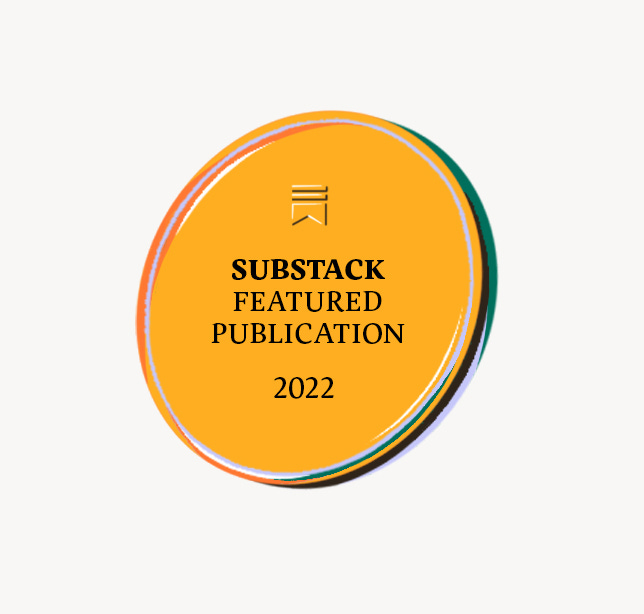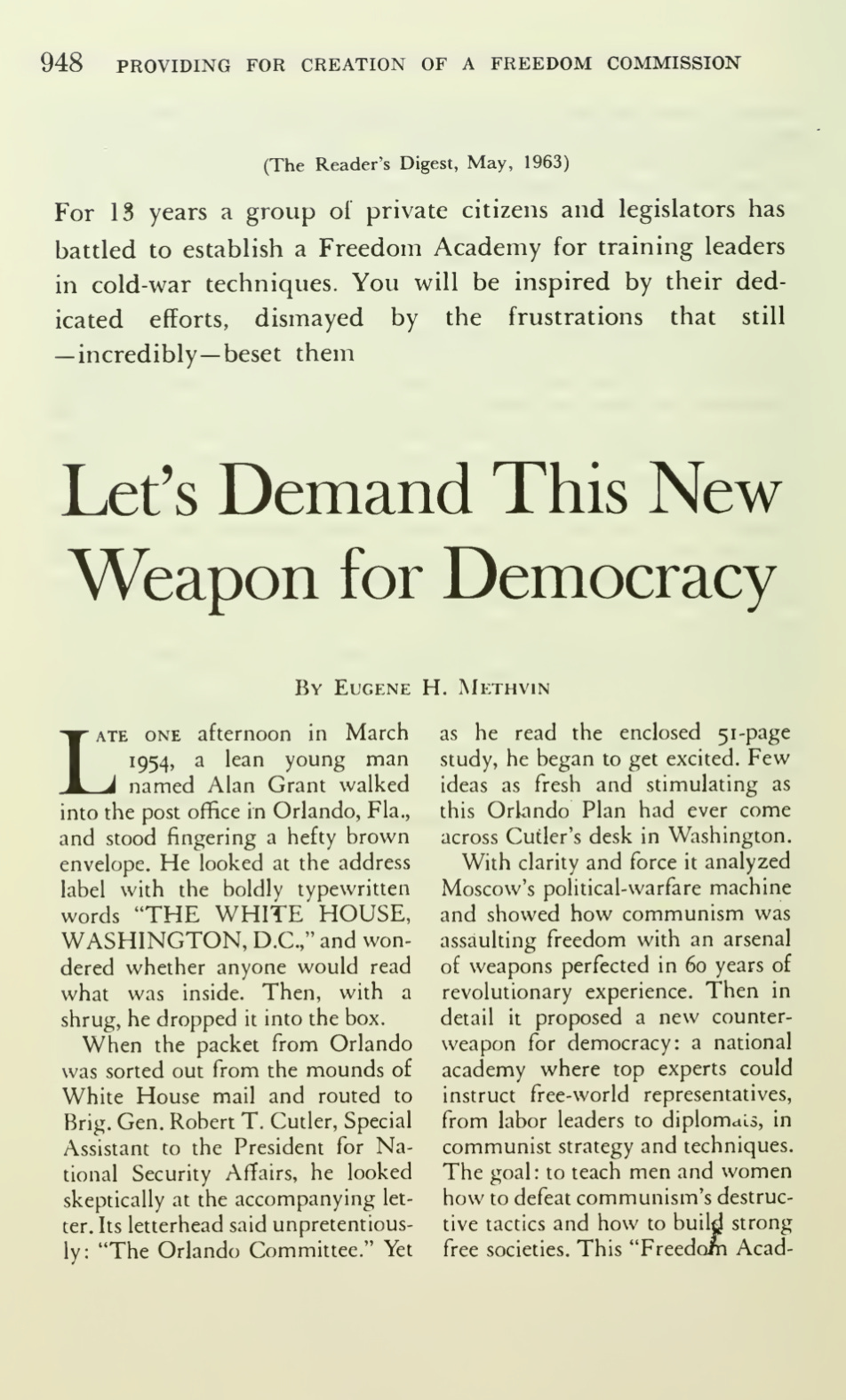What is (was) the Freedom Academy?
“The strategy and tactics being used against us are so foreign to our thought patterns, and the problem [that] this new type of warfare presents is so vast and complex, that it is difficult for us to hurdle the mental roadblocks and come up with the right answer, even when that answer is very plain.” — The Orlando Committee, proposing the creation of the Freedom Academy
In 1959, a man named Alan Grant testified to Congress in support of a proposal to create an independent academy to educate government officials, journalists, teachers, business people, labor leaders, and ordinary citizens about Soviet propaganda and disinformation. He called it the Freedom Academy.
Grant was a graduate of Harvard Law School who had studied guerrilla warfare. As he researched Communist tactics during the Cold War, he discovered that the Soviet Union was engaging the United States in an invisible war that Americans had no idea they were fighting. Historian Stacey Cone detailed his discoveries as follows:
Through the successful deployment of psycho-political tactics, Grant determined, communism was spreading very much as Marx and other Communist leaders had predicted. Their new approach to fighting was non-military, long-term, and indirect—no battlefields, bullets, or bombs were necessary. Instead, Communists used organized persuasion and mass propaganda campaigns to subtly and slowly win people in great numbers to their side. The concept Grant believed, was brilliant guerrilla strategy—a method that an open democracy could least prevent or defeat. Freedom of political thought and speech were hallmarks of democracy, but the Communists were insidiously turning both into vehicles whereby freedom’s enemy could render democracy vulnerable while remaining invisible during the attack. Unless Americans could come to understand what was happening, Grant thought, they were likely to lose this bloodless war. Ironically, he believed, it was possibly the most important battle of all. Nothing short of the American way of life was at stake.
Examining how educational institutions, including his alma mater, were training students about this threat, Grant was both shocked and disappointed. He found that universities trained students broadly in “area studies,” but not in understanding the psychological tactics that the Soviet Union was deploying against the United States and other countries around the world. Grant also discovered that secondary institutions were not adequately teaching history and civics in order to prepare future citizens of the importance of democracy.
Grant gathered a group of likeminded individuals in his hometown of Orlando, Florida to form what became known as the Orlando Committee. The Committee drew up a proposal for a government- and privately-funded institution that would train both Americans and foreign students in understanding Soviet information warfare tactics and countering them by advocating for the “essentials of democracy” around the world. The Orlando Committee sought to create a bipartisan coalition in support of the plan, recognizing that fighting Communism on the psychological battlefield would require transcending political ideologies and a uniting under a shared commitment to democracy. Their proposal was sent to about 170 influential government officials, journalists, intellectuals, and authors from the right and left of the political spectrum, and in 1958, Grant’s congressman, Albert Sydney Herlong (D-FL), agreed to introduce it in Congress.
The Freedom Commission Act proposed the creation of the Freedom Academy, a training facility to educate government officials and ordinary citizens on the threat of Soviet information warfare and how to counter it using democratic ideals, with the hope that they would spread that knowledge to their respective peers and communities. The Academy would be overseen by a Freedom Commission, an independent, executive branch agency that would have six Senate-confirmed members and a chairman. It was initially introduced in Congress in 1959 by Rep. Herlong and Rep. Walter Judd (R-MN). It received favorable editorial coverage from magazines and newspapers across the country, including Life, the New York Daily News, the St. Petersburg Times, and Reader’s Digest.
What happened after is perhaps a testament to both the virtues and weakness of our democratic processes. After the bill fizzled in the House, it was reintroduced in the Senate Judiciary Committee — again with bipartisan support — in 1959. Although it was met with great support, the House Un-American Activities Committee (ironically enough) resisted it, as did several government agencies like the Justice and State Departments, which didn’t see the need for a new agency competing with their resources and mandates. Ultimately, the combination of political climate, agency turf-protecting, and disagreements about how to combat psychological warfare in ways compatible with democracy won the day, and the Freedom Academy never became a reality.
When I first read this history, I was fascinated. I’m an Assistant Dean and Senior Lecturer at the Yale Jackson School of Global Affairs, where I teach a class called Russian Intelligence, Information Warfare, and Social Media. I’m also a lawyer and the former Dean of Admissions at Yale Law School. And before that, I was a Special Agent in the counterintelligence division of the FBI. The Freedom Academy brought together my interests in foreign affairs, law and policy, and counterintelligence.
I loved the idea of a knowledge hub where people from all backgrounds convened to learn about how adversaries were manipulating their perceptions and society and empowering them to respond in ways that strengthen our democratic and social fabric. Sort of a “citizen’s academy” for democracy. For a brief time I wondered if such a program could be created as a center at a university — but working at one myself, I know that universities are primarily research institutions, and were ill-suited to the broad-based, practical purpose the Freedom Academy envisioned.
When I thought about creating a Substack, I knew I only wanted to do it if I could 1) offer something unique that readers couldn’t find anywhere else and 2) took advantage of the community-building capacity of this platform. I immediately thought of the Freedom Academy. My goal is to channel the spirit of Grant’s vision and use this platform to educate and create a community around understanding the threat of disinformation and its impact on democracy. Perhaps it’s fitting that this Freedom Academy is manifesting in an online format, given that the threat of information warfare today presensts largely in cyberspace. The great part is that this format has the capacity to bring together more people than the original concept ever imagined!
How does the Freedom Academy work?
The central part of this Substack is a course called “Democracy in the (Dis)Information Age.” Every other week (usually on Wednesdays), I’ll post a reading or video along with my written “lecture” on that topic as well as discussion prompts to share your thoughts and comments with each other. You will also have access to the groups chats and I will have regular Zoom “office hours” Q&As for us to meet and talk in person. My hope is to also do some video interviews/guest lectures each month with authors of some of the books and articles we are reading. The class lectures will build on each other and refer back to earlier topics, but they will be presented in bite-sized chunks that can stand alone if you missed some weeks or are coming in late. For me, having the chance to go through my material bit by bit is a huge luxury, as it gives me a chance to do a deep dive on nuances that I sometimes can’t explore when I am forced to cover it all in one semester. Here on Substack, we have all the time in the world! (And trust me, we won’t run out of material.)
For the Freedom Academy course, the initial lessons will be free, and I will offer free previews of the course material from time to time. But, my goal is to create an interactive community built around enthusiasm for the subject, a robust exchange of ideas, and camaraderie — much like a real classroom. So after the first few weeks, the lectures, as well as the ability to participate in discussions and Zoom chats, will be for my paid subscribers.
But there is free content! Every other week (and more frequently if I can), I will publish a free post. Ideally, these will offer an angle on topics in the news connected to things we are covering in class. But when the news cycle gets really juicy, they may involve longer pieces inspired by the thoughts or threads I post on Twitter. (And if Twitter tanks completely, this is where you’ll find me and my hot takes, and they will definitely be free!)
All of this, of course, is both an experiment and a work in progress. I’ll enable comments on some of my free posts, so please do offer feedback and let me know what you’d like to see and hear more about as a subscriber.
Thank you for taking the time to visit my Substack. I hope you will subscribe to any version of it that piques your interest. I’m so excited to get started on this journey together.





